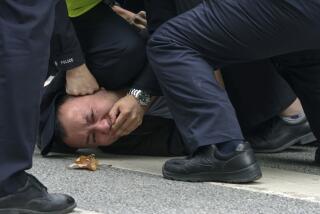Violators Subject to Fine of 16 Cents : China Revives War on Habit of Public Spitting
- Share via
PEKING — Five decades ago, as part of its “new life” campaign to clean up China, the Nationalist government of Chiang Kai-shek sent out squads of soldiers to stop city residents from spitting in the streets.
The effort eventually failed. But of late, the Communist regime headed by Deng Xiaoping has revived the official war on the age-old Chinese habit of public spitting.
A year ago, officials in Peking adopted new rules under which anyone in the city who spits on the streets or in theaters, parks, offices, airports or train stations is subject to a fine of 50 fen (16 cents).
A special force of health inspectors was sent onto the streets to enforce the ban and the fines. In some instances, they were armed with microscopes, which they used to give violators some on-the-spot biology lessons about the harmful, unsanitary nature of spitting.
“The public can no longer bear this unhealthy practice, and complaints have been lodged from citizens and visitors from abroad,” one newspaper commentary said at the time. “Efforts to eliminate spitting will not only clear the capital’s ground of phlegm, but purify people’s minds and raise the nation’s moral standards.”
Since then, other leading Chinese cities, including Shanghai, Tianjin and Canton, have all followed Peking’s example. In Canton, the effort included signs on public billboards and in stores that said, “Keep fit. Don’t spit.”
In Shanghai, authorities last month were reported to have sponsored outdoor stage performances to publicize the harmful effects of spitting.
A Broader Effort
The anti-spitting campaign is the most visible component of a broader effort to try to clean up Chinese cities.
At one point last year, the Economic Daily, an official organ of the Chinese Communist Party, even assigned a team of reporters to compare the public lavatories of 10 leading cities.
The paper eventually reported that in the Huangpu district of Shanghai, there was only one public toilet for every 12,000 people, and, that although Tianjin had built many new lavatories, it had failed to install any water-flushing systems.
Ever since Westerners began arriving in China, they have been suggesting efforts to sanitize and deodorize what they found to be the earthier aspects of life here.
“We are all of us getting sick of Peking. A dirtier town does not exist,” wrote a young British captain, Charles George Gordon, in 1860 during the expedition to Peking in which British and French forces destroyed the Qing Dynasty’s Summer Palace. “I am sure one ride through its filthy streets ought to content any enthusiast.”
Correspondent’s Memoirs
In his memoirs, American correspondent Theodore White, stationed during World War II in the Nationalist headquarters at Chongqing, recalled vividly the city’s night-soil collectors, who “emptied the thunder boxes of every home every morning” and took it to a Yangtze River collection point “famous for its stench.”
To many Chinese, such Western finickiness seem excessive. After all, Westerners, too, have many customs and habits that the Chinese find offensive--such as eating raw vegetables and huge slabs of meat.
In his book, “Beyond the Melting Pot,” about his recent two-year visit to the United States, Chinese reporter Liu Zongren said that his wife found it “disgusting” to see Westerners or young Westernized Chinese kissing in public streets and parks.
Perhaps because of popular resentment against Western crusades to clean up China, spitting has occasionally been viewed here as a way of expressing anti-foreign and anti-government sentiments, especially during times of social tension.
Boxer Rebellion
During the Boxer Rebellion in 1900, one of the chants of the revolutionaries was, “Certainly . . . foreign soldiers are a horde. But if each of our people spits once, they will drown.”
Vergil Berger, who was the Reuters news agency correspondent in Peking during the early days of the Cultural Revolution in 1966-67, recalled recently that he was frequently spat upon during that period. “When it first happened, I would come home in the winter and my wife would ask me why I was covered with ice,” he said.
Medical experts believe there are some scientific reasons for the custom of spitting, at least in Peking and other cities of North China.
“It’s from the irritants in the air, the fine dust that blows in from the Gobi (Taklamakan) Desert,” one Western scientist here said, asking not to be quoted by name. “That dust contains a high concentration of aluminum sulfate. It’s very irritating to the mucous membranes. Apart from that, there’s the air pollution. The problem is even worse in northern cities with more factories, such as Shenyang (Mukden).”
Incidence of Cancer
Apparently because of the irritants in the air, Peking and the North China region surrounding it have the highest incidence in the world of nasal pharyngeal cancer--cancer of the nasal tract. Doctors also say that inflamed sinuses and upper respiratory infections are particularly common in North China.
On the other hand, China has made such headway against tuberculosis (whose bacillus is carried by phlegm) that it is no longer considered the serious problem it once was. Peking used to have two sanitariums for tuberculosis patients and has now converted both facilities to other uses.
Last June, the month after Peking’s anti-spitting drive began, authorities reported that they had caught 140,000 violators and had fined more than 100,000 of them on the spot.
Since then, Peking officials have continued their efforts. Mayor Chen Xitong donned a health inspector’s badge last summer and toured city streets to publicize the anti-spitting campaign and push for a city cleanup.
“Take me to public lavatories, free markets and small restaurants,” the mayor said. “I go where there is filth. OK?”
The Peking campaign has produced more than the usual share of Chinese humor.
According to one story making the rounds here, a policeman stopped one young man for spitting in front of the city railroad station and demanded that he pay the fine of 50 fen.
The man pulled out a bill of one Chinese yuan, which is 100 fen, and asked for change. When the policeman said he had none, the man opted to get his money’s worth by immediately violating the law again in the vicinity of the policeman’s shoe.
Of late, Peking authorities have turned to a new technique: humbling spitters through public embarrassment. On March 26, the Peking Daily published the names and addresses of 15 bicyclists it said were observed spitting and “leaving behind vile traces” on city streets.
This approach turned out to be less than successful. After subsequent investigation, two of the 15 spitting suspects were found not guilty after they produced eyewitnesses who said they had not ridden bikes to work on the day in question.
Last week, however, authorities indicated they will continue the anti-spitting campaign.
“Only when more and more people cultivate good social virtue will public hygiene and order see a change for the better,” the Peking Daily said in a commentary. “Only then will the capital be a clean and beautiful city.”
More to Read
Sign up for Essential California
The most important California stories and recommendations in your inbox every morning.
You may occasionally receive promotional content from the Los Angeles Times.













